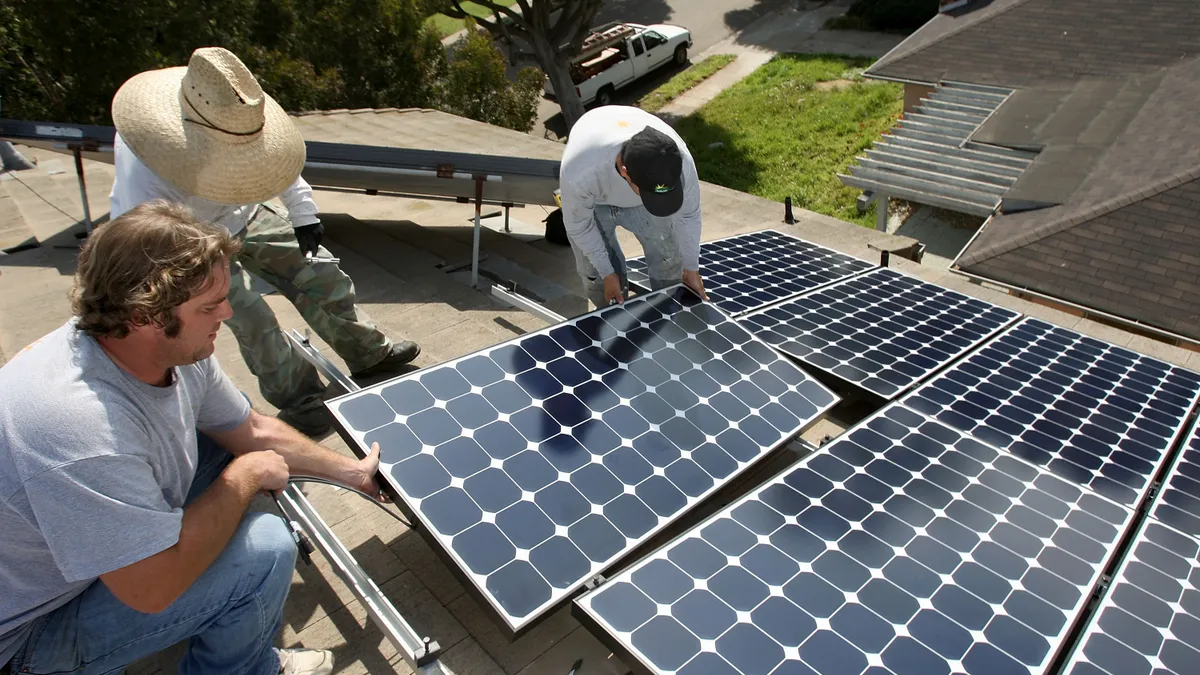The following is a contributed article by Dave Rosenfeld, executive director at the Solar Rights Alliance.
Recent coverage of California's solar net metering battle has not necessarily provided a full picture of what's happening in the state.
One could conclude that California's larger environmental community is siding with the utility-driven effort to slow the growth of rooftop solar by reducing net metering credits and adding expensive fees that could reach up to $91 a month for residential consumers and $3,400 for schools, churches and small businesses that want to go solar.
But that's far from the reality. Notable environmental leaders and advocates fighting climate change are against what we call the utility profit grab and instead want California to keep solar growing and affordable through smart policies like net metering, which are the reason why middle and working class neighborhoods are just under half of California's rooftop solar market.
In fact, Environmental Working Group, 350 Bay Area and the Protect Our Communities Foundation are parties to the California Public Utilities Commission's net metering proceeding and submitted proposals calling on the CPUC to strengthen net metering by making it easier and cheaper for everyone — including lower-income Californians and renters — to benefit directly from rooftop solar. Their position is backed by over 400 organizations and community leaders reflecting California's climate change, conservation, racial and economic justice, consumer protection and affordable housing advocacy communities.
The campaign to keep rooftop solar growing, affordable and a critical component of California's path to 100% renewable energy, is supported by a coalition of hundreds of organizations and leaders representing environmentalists, climate advocates, consumer rights groups, faith communities, environmental justice, renters and affordable housing groups. These are organizations with actual constituencies and leaders with real followers, which is what separates the effort from the few top-down, staff driven groups who are part of the investor-owned utility coalition.
Why do so many of us want to stop the utility profit grab and save rooftop solar in California? The reasons are as deep and diverse as our coalition itself.
First of all, we can dispense with the utility campaign's "cost shift" myth. It's based on bad math that does not account for the grid-stabilizing investment solar consumers make in their own systems, massive savings from avoided transmission line construction, or the fact that solar consumers are using a reduced amount of electricity from the grid.
The truth is, rooftop solar saves everyone money. A new grid modeling report from Vibrant Clean Energy shows growing local solar and storage would save California ratepayers $4 billion a year, adding up to $120 billion over the next 30 years, the equivalent of $295 per year for the average California ratepayer. Utility proposals to curb rooftop solar would have the opposite effect. By essentially halting the local solar and storage market, and turning potential savings into costs borne by consumers, the utility profit grab would cost California tens of billions over time.
Not only does growing rooftop solar save everyone money on the way to 100% clean energy, a sustained commitment to rooftop solar is the only way we will ever reach the goal in the first place. California is in a race for reliable energy before the next crisis hits and this is no time to slow down or go backwards. California's energy regulators found California needs at least 28 GW of rooftop solar by 2045. We are currently at 10 GW. The Biden Administration's plan calls for America to double its annual solar installations every year between now and 2025 and then quadruple between 2025 and 2030. Dimming the lights on rooftop solar now puts clean energy commitments out of reach.
There's more. Over 55 conservation organizations from The Nature Conservancy to Basin and Range Watch recently sent a letter to Governor Newsom and the CPUC pointing out that as we make our way towards developing clean energy, we need to do so without harming other parts of our natural environment. Rooftop solar spares our land and open spaces. The utilities' proposal to squash the growth of rooftop solar will mean more land-intensive solar and wind farms and long-distance transmission lines. That could see us use an extra 100,000+ acres of land to reach our clean energy goals.
A recent report by Environment California found that 28 GW of energy — the amount California regulators say we need by 2045 to hit the state's clean energy goals — would take up 148,000 acres of land if we developed all that energy by way of utility-scale projects, putting open spaces and wildlife habitats at risk. That approach to clean energy is incompatible with other climate change-fighting policies, like Governor Newsom's recently announced goal of protecting 30% of California's open space by 2030.
Of course, there are also all the other well-known benefits of rooftop solar. It helps consumers of all types save money on their energy bills at a time when many households and small businesses are looking for ways to cut costs. Rooftop solar also supports tens of thousands of family-supporting jobs and could support 250,000 more by 2030 in California if we continue to bring rooftop solar to more people.
With all that's good about rooftop solar, it's no wonder recent polling shows a super-majority of 80% of voters across parties support net metering and 85% of voters want to see California either maintain or expand its current commitment to encourage rooftop solar across the state.
Unlike the rest of us, utilities have a monetary incentive to halt the growth of rooftop solar. Utilities make much of their profits by charging consumers for building transmission lines and other costly developments. More rooftop solar threatens that lucrative revenue stream. By contrast, it is shocking to see those who should know better align themselves with the utility profit grab.
California is on fire and we are in a race for solutions before the next crisis. Consumers are paying the price for outdated, unwieldy electric grids, often at the expense of their lives and livelihoods. This is not the time to be messing around with changes that would make rooftop solar unaffordable for most households and frustrate the state's transition to clean and reliable energy.
California is making progress towards clean energy and solving the climate crisis by growing rooftop solar. To finish the job we need a lot more rooftop solar for everyone, everywhere. Turning back now would be as senseless as it is irresponsible.





















